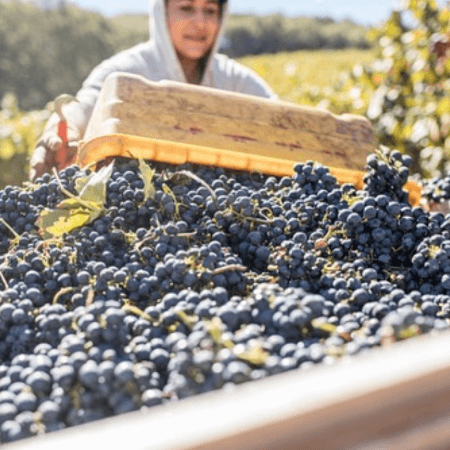Natural wine has been a category of interest to a niche population for many years. Technically natural wine has been made for thousands of years – indeed, the earliest wines ever made were, by definition, “natural” – but it emerged as a modern category in France in the 1950s. It has always had a loyal following, but the last decade or so has seen a significant uptick in interest in the category.
At its core, natural wine is produced with the fewest possible interventions and inputs, from the vineyard to the bottle. The belief is that this style of wine allows for the truest expression of the terroir and the varietal.
Here, we will explore the essence of natural wines, compare and contrast them with their traditional and organic counterparts, and explore the recent rise of their popularity.
What Are Natural Wines?
“Natural wine” does not have a clear definition that is agreed upon within the industry or mandated by the government. There is also no certifying body for “natural wine” meaning that any wine producer is free to use that label, regardless of their growing or winemaking processes.
That said, the adherents to natural wine typically share a general set of values and guidelines. In the vineyard, farmers growing grapes for natural wines stick to principles of organic or biodynamic farming. This approach rejects the synthetic pesticides and fertilizers common in conventional grape growing, prioritizing biodiversity and soil health.
Natural winemakers are defined by their commitment to minimal intervention throughout the winemaking process. Unlike conventional wines, which often incorporate additives for stabilization and flavor enhancement, natural winemakers avoid additives like commercial yeasts and sulfites, or use them sparingly, allowing fermentation to occur naturally. The result is a wine that reflects the unique characteristics of the grape varietal or varietals, as well as of its vineyard, known in winemaking as terroir.
Natural wines may exhibit a broad spectrum of flavors and aromas, often characterized by earthy or “funky” notes not typically found in commercial wines. And, since the generally accepted guideline for natural wine producers is that no stabilizers are used, they are typically best consumed when they are young, within a year or two of bottling.
Natural Versus Organic Wines
In many ways, natural and organic wines are similar. They both have low-intervention farming philosophies and winemaking processes. They both appeal to a certain type of consumer. However, organic wine, or the more common designation “made with organic grapes” must follow a strict set of rules and be certified by an approved body in order to use those terms. Due to the lack of regulation around the term ‘natural’, any wine could be legally called ‘natural,’ but not just any wine can be labeled ‘made with organic grapes.’
Wines made with organic grapes are approved to use a small amount of sulfites as a stabilizer, extending the wine’s shelf life so that it will taste the same (or, depending on the varietal, even better) several years after being bottled. This means that wines made with organic grapes can have a longer cellaring potential than natural wine.
Bonterra Organic Estates does not label its wines “natural,” but all of our wines are made with organic grapes, ensuring that our farming and winemaking practices are low-intervention and allowing for a pure expression of the varietal.
Additionally, our Single Vineyard and Estate Collection wines are Regenerative Organic Certified (ROC), which covers a collection of practices that focus on regenerating soil health and the full farm ecosystem. And, to be truly regenerative, a system must also take care of the farmers who work the land; this is one of the key pillars of ROC. Bonterra is proud to be the largest winery to achieve this rigorous certification.
Why Are Natural Wines Gaining Popularity?
There are several factors that are contributing to the rise in popularity of natural winemaking. .
Consumer trends: There’s been a notable shift toward sustainability among consumers for the past 20 years. A more recent trend combines that with a preference for authenticity: many people prefer products whose origins they can trace, with simple ingredients that have not been overly manipulated. Both natural wines and wines made with organic grapes align with these values, appealing to individuals seeking products with minimal intervention as well as a minimal ecological footprint.
Unique Flavors: Natural and organically farmed wines offer diverse and distinct flavor profiles, showcasing the raw expression of grape varietals and terroir. This attracts adventurous wine drinkers eager to explore new experiences.
Health Consciousness: With concerns about additives and chemicals in food and beverages on the rise, organically farmed wines present an attractive alternative. Their reduced sulfite levels and minimal processing appeal to health-conscious consumers, and the fact that they are typically farmed organically appeals to the same set of consumers who want to leave the earth better than they found it.
Cultural Shift: Influential figures in the culinary world, including sommeliers and chefs, have championed natural wines. Their endorsement has contributed to a broader cultural movement favoring alternative and unique products. And, as the world gets more and more complex, many consumers also yearn for a “simpler” time, and natural or organically farmed wines are seen to fit that category; with minimal intervention, they are seen as an unfussy option that harkens back to a different era.
Challenges and Criticisms of Natural Wine
While natural wines have a lot to recommend them, they are not without their challenges. Variability in quality and stability can be significant issues due to minimal intervention during production. A natural wine may taste significantly different after just a few months in the bottle, which makes them a challenge for many retailers to stock since shelf-stable products (which wine typically is) are more attractive from an inventory perspective. It also makes them a bit of a gamble for people who don’t want to run the risk of buying a bottle of wine that may not meet their expectations.
Additionally, the lack of a standardized definition or certification for natural wines can lead to confusion among consumers and inconsistencies in the market. Since there is no government-approved definition, anyone may call their wine “natural” without consequence. And, without a rigorous certification process, it’s hard to know which natural wines meet consumers’ expectations of farming and winemaking practices.
In the United States, “organic” is a government-regulated label that indicates that something was produced according to the USDA organic standards, which mandate practices that cycle resources, conserve biodiversity, and preserve ecological balance. Agricultural products can be called organic if they are certified to have grown on soil that had no prohibited substances applied for three years prior to harvest.
The benefit of having a legal definition and certifying bodies for a brand to use the “organic” designation is that it creates a trustworthy and impartial standard consumers can rely on.
Bonterra Organic Estates is certified by the Regenerative Organic Alliance, a certifying body that goes even further than USDA Organic standards and one we believe provides the most thorough and rigorous certification process available anywhere in the world. Bonterra is proud to go above and beyond to ensure we are doing our part for the world and creating wines that our customers can feel good about buying and drinking. We are genuine in our commitment to planet-first practices, and to us, “greenwashing” is a dirty word.
The Future of Natural Wines
Natural wines are poised to carve out a significant niche within the wine industry. As consumer preferences continue to evolve toward sustainability and transparency, the demand for natural wines is likely to grow. Despite challenges, their unique flavors and ecological credentials position them as a compelling choice for wine enthusiasts seeking authenticity and a deeper connection to the land.
The rise of natural wines signifies a movement toward a more conscientious approach to winemaking and consumption. However, consumers who want to ensure that what they are buying and consuming is truly putting planet first should opt for wines that are certified by an organization they trust that has rigorous standards and transparency. The Regenerative Organic Alliance and the USDA both offer this assurance, contributing in no small part to the recent exponential growth of organic wine sales. ROA goes further by also having a social fairness pillar, ensuring that the people working the land are also taken care of.
At Bonterra Organic Estates, we’re proud to be planet AND people first. We take pride in our organic winery and our Bonterra wines. We craft and sell wine online for wine enthusiasts like you to enjoy at home. You can even join our wine club for exclusive offers and releases. Bonterra is committed to leading natural winemaking, and moving toward a sustainable wine industry.










 TOP
TOP
